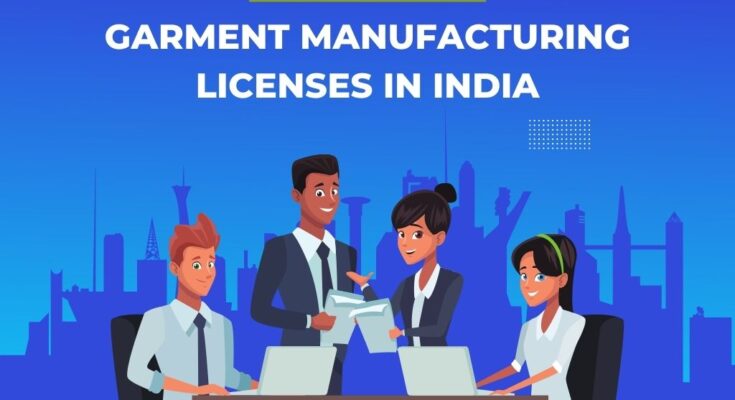The garment manufacturing sector in India is a vital component of the country’s economy, contributing significantly to employment generation and export revenues. As with any industrial activity, operating a garment manufacturing unit in India requires compliance with a range of licenses and regulations. These licenses are designed to ensure adherence to safety standards, fair labor practices, environmental protection, and overall business transparency. In this article, we will explore the various licenses applicable to the garment manufacturing sector in India, their importance, and the process of obtaining them.
1. Factory License: The Factory License is one of the most fundamental licenses required for any manufacturing establishment, including garment factories, in India. It is governed by the Factories Act, of 1948, and is issued by the respective State Governments. The purpose of this license is to regulate the working conditions within the factory premises, ensuring the safety, health, and welfare of the workers.
The application process for a Factory License involves submitting various documents, such as a layout plan of the factory, details of machinery used, number of employees, and compliance with safety measures. Once issued, the license needs to be renewed periodically, and any modifications or expansions to the factory require proper approvals from the concerned authorities.
2. Trade License: The Trade License is mandated under the Municipal Corporation Act of each state or city, depending on the location of the garment manufacturing unit. It is permission granted by the local municipal authority to carry out a specific trade or business activity within its jurisdiction. Garment manufacturers must obtain this license before commencing their operations.
The application process for a Trade License involves providing basic information about the business, proof of ownership or lease of the premises, and compliance with certain zoning regulations. The license may require annual renewal, and failure to obtain or renew it can lead to penalties or even the closure of the business.
3. Bureau of Indian Standards (BIS) Certification: BIS certification is crucial for garment manufacturers producing and selling products that fall under the mandatory quality control order of the Indian government. The certification ensures that the garments meet the specified safety and quality standards, protecting consumers from substandard or harmful products.
The BIS certification process involves product testing in authorized laboratories, compliance with relevant Indian standards, and factory inspections. After successful completion of the process, the manufacturer is granted a BIS certification mark, which they can display on their products.
4. Goods and Services Tax (GST) Registration: GST is an indirect tax levied on the supply of goods and services, and it replaced multiple taxes and levies that were previously applicable in India. All garment manufacturers with an annual turnover above the prescribed threshold must obtain GST registration.
The GST registration process involves applying online through the GST portal, providing necessary business details, and obtaining a unique Goods and Services Tax Identification Number (GSTIN). Failure to register for GST can lead to penalties and legal consequences.
5. Labour Licenses and Registrations: In addition to the Factory License, garment manufacturers need to obtain several labor-related licenses and registrations to ensure fair employment practices. Some of the essential ones include:
Employee Provident Fund (EPF) Registration: EPF is a social security scheme for employees, and employers with a certain minimum number of employees must register for EPF and make regular contributions to the fund.
Employee State Insurance (ESI) Registration: ESI is a health insurance scheme for workers, and employers must register under ESI if they have the minimum required number of employees. Professional Tax Registration: Some states in India levy professional tax on employees’ income, and employers must register and deduct the tax from their employee’s salaries.
5. Contract Labour License: If the garment manufacturing unit employs contract labor, the employer must obtain a license under the Contract Labour (Regulation and Abolition) Act, 1970. Employment Exchange Registration: In certain states, employers need to register their vacancies with the local employment exchange.
6. Environmental Clearance: Garment manufacturing units, like any industrial operation, have the potential to impact the environment. Therefore, businesses must obtain environmental clearance from the State Pollution Control Boards or the Ministry of Environment, Forest, and Climate Change, depending on the scale of operations.
The environmental clearance process involves submitting detailed information about the manufacturing process, water and energy consumption, waste management, and measures taken to mitigate any adverse environmental effects.
7. Trademark Registration: If a garment manufacturing unit intends to create a unique brand identity for its products, it is advisable to register its brand name and logo as trademarks. Trademark registration provides legal protection against unauthorized use and infringement of the brand, helping to build brand value and goodwill in the market.
The trademark registration process involves a comprehensive search to check for existing similar trademarks, filing an application with the Trademark Registry, and responding to any objections raised during the examination process.
8. Fire Safety License: Fire safety is of utmost importance in any manufacturing unit, and obtaining a fire safety license is mandatory for all garment factories. This license is issued by the local fire department after inspecting the premises to ensure compliance with fire safety regulations and the availability of fire-fighting equipment.
9. Import-Export Code (IEC): If a garment manufacturer wishes to engage in the export or import of goods, they must obtain an Import-Export Code (IEC) from the Directorate General of Foreign Trade (DGFT). The IEC is a unique 10-digit code that acts as an identification number for exporters and importers.
The application process for obtaining an IEC involves submitting relevant documents, such as a PAN card, bank certificate, and passport-sized photographs, along with a fee.
10. Health and Safety Certifications: Some international buyers may require garment manufacturers to comply with specific health and safety standards. While not mandatory under Indian law, obtaining certifications like SA8000 (Social Accountability 8000) or ISO 45001 (Occupational Health and Safety Management System) can enhance a manufacturer’s reputation and marketability, opening doors to international markets.
Obtaining these licenses is not only a legal requirement but also a step toward building a reputable and sustainable business. Garment manufacturers need to stay updated with the latest regulations and fulfill their responsibilities as employers and business owners. Compliance with these licenses not only fulfill legal obligation but also adds credibility to the manufacturer. Many time complying with such obligations improves business operations as well as mitigate the risks like fire breakout, power failures, accident prevention, etc.
If you want to accelerate your business growth with minimal effort and smooth operations, start following MSME HelpDesk on social media platforms to enrich your knowledge and network. You may also attend upcoming sessions or events or may take professional advice or mentorship to leverage more.


